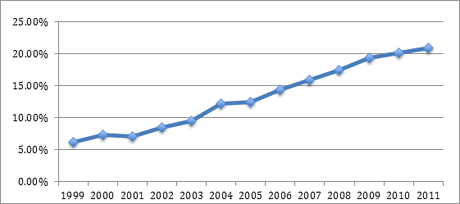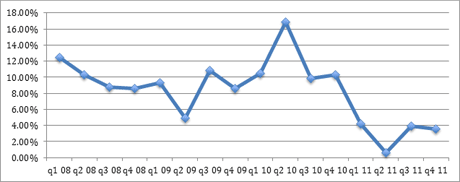Domino’s Pizza: great business, shame about the price
Domino's Pizza is a great success story, with the price of its shares up 20-fold since it floated in 1999. But can it keep on delivering for investors? Phil Oakley investigates.
Get the latest financial news, insights and expert analysis from our award-winning MoneyWeek team, to help you understand what really matters when it comes to your finances.
You are now subscribed
Your newsletter sign-up was successful
Want to add more newsletters?

Twice daily
MoneyWeek
Get the latest financial news, insights and expert analysis from our award-winning MoneyWeek team, to help you understand what really matters when it comes to your finances.

Four times a week
Look After My Bills
Sign up to our free money-saving newsletter, filled with the latest news and expert advice to help you find the best tips and deals for managing your bills. Start saving today!
Domino's Pizza (LON:DOM) has been a great success story. Since it listed on London's AIM market in 1999, the shares have risen more than 20-fold. But can it keep on delivering for investors?
A brilliant business model
Most of the 700+ Domino's stores are franchised. People pay around £280,000 to own and operate a franchise. The company then provides them with the support (ingredients, equipment, marketing etc) needed to grow sales and profits.
You only have to look at franchised businesses such as McDonald's and Holiday Inn to see the attraction of franchising. Franchisees pay royalty streams based on their sales back to the parent company, but they also have to deal with most of the costs of running the business.
MoneyWeek
Subscribe to MoneyWeek today and get your first six magazine issues absolutely FREE

Sign up to Money Morning
Don't miss the latest investment and personal finances news, market analysis, plus money-saving tips with our free twice-daily newsletter
Don't miss the latest investment and personal finances news, market analysis, plus money-saving tips with our free twice-daily newsletter
This is great news for the franchisor. It gets a stream of cash without a lot of extra costs. If the number of franchises grows, then the profitability of the franchisor begins to mount up.
Domino's Pizza operating margins

This is exactly what has happened with Domino's Pizza. Its 2011 results show operating profit margins of 20.8% on sales of £209.8m. What's even more impressive are its investment returns.
Domino's has invested £77m in its business. With profits of just over £43m, this equates to a return on investment of 55% - not many businesses can do this.
A very expensive stock
So no doubt about it, Domino's is a great business. The problem for anyone thinking of investing in the stock is that the market already knows this.
At 470p a share, it trades on 22 times expected 2012 profits. That's punchy. Sure, it's down from levels of nearly 600p seen last year, but Domino's still has to deliver strong profits growth to justify even its current price.
So how likely is that?
Well, Domino's has ambitious growth plans for the UK and has just set up in Germany. During the next ten years it plans to grow its total number of stores from 726 to at least 1,200 an increase of 65%.
These new stores will take time to mature and deliver good profits, but should provide some growth.
But what about the existing stores? Here the outlook is arguably less rosy.
Domino's Pizza like-for-like sales

The company's pizzas are good - but they're also quite expensive. With UK consumers strapped for cash, they may not buy as many. They may trade down and buy pizzas from the supermarket instead. And the decline in the group's like-for-like sales growth suggests this may be happening.
The sales performance is still respectable, but is it good enough to generate the profits growth needed to justify the current share price? New products such as stuffed crust pizzas and online ordering will help, but the economic climate is against it.
Whilst sales are still holding up, we are worried that like-for-like sales could turn negative - as happened in Ireland. This is important, as the group's profits are very sensitive to changes in sales. Falling sales means less royalty revenues and a potential big hit to profits. At current levels, the share isn't priced for this scenario.
What about dividends?
Domino's shares offer a prospective dividend yield of 3% - not bad, but hardly stellar. And on top of that, it's paying out two thirds of its profits and virtually all of its free cash flow in dividends. In other words, it can't realistically grow its dividends much more rapidly than earnings.
So even though it's a great business, the high share price means the risk/reward balance simply isn't worth it. We reckon there's a good chance that profits growth could disappoint in the future. It's time to take some profits if you haven't already.
Get the latest financial news, insights and expert analysis from our award-winning MoneyWeek team, to help you understand what really matters when it comes to your finances.
Phil spent 13 years as an investment analyst for both stockbroking and fund management companies.
-
 Should you buy an active ETF?
Should you buy an active ETF?ETFs are often mischaracterised as passive products, but they can be a convenient way to add active management to your portfolio
-
 Power up your pension before 5 April – easy ways to save before the tax year end
Power up your pension before 5 April – easy ways to save before the tax year endWith the end of the tax year looming, pension savers currently have a window to review and maximise what’s going into their retirement funds – we look at how